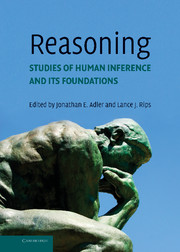21 - Individual Differences in Reasoning and the Algorithmic/Intentional Level Distinction in Cognitive Science
Published online by Cambridge University Press: 05 June 2012
Summary
When a layperson thinks of individual differences in reasoning they think of IQ tests. It is quite natural that this is their primary associate, because IQ tests are among the most publicized products of psychological research. This association is not entirely inaccurate either, because intelligence – as measured using IQ-like instruments – is correlated with performance on a host of reasoning tasks (Ackerman, Kyllonen, and Roberts 1999; Carroll 1993; Hunt 1999; Lohman 2000; Lubinski 2004; Rips and Conrad 1983; Sternberg 1977, 1985). Nonetheless, a major theme of this chapter will be that certain very important classes of individual differences in thinking are ignored if only intelligence-related variance is the primary focus. A number of these ignored classes of individual differences are those relating to rational thought.
In this chapter, I will argue that intelligence-related individual differences in thinking are largely the result of differences at the algorithmic level of cognitive control. Intelligence tests thus largely fail to tap processes at the intentional level of control. Because understanding rational behavior necessitates understanding processes operating at both levels, an exclusive focus on intelligence-related individual differences will tend to obscure important differences in human thinking.
This argument obviously depends strongly on differentiating the algorithmic from the intentional level of analysis. Therefore, in the next section I will outline the sources that I rely on for this conceptual distinction and how I will utilize the distinction to provide a framework for thinking about individual differences in reasoning.
Information
- Type
- Chapter
- Information
- ReasoningStudies of Human Inference and its Foundations, pp. 414 - 436Publisher: Cambridge University PressPrint publication year: 2008
References
Accessibility standard: Unknown
Why this information is here
This section outlines the accessibility features of this content - including support for screen readers, full keyboard navigation and high-contrast display options. This may not be relevant for you.Accessibility Information
- 3
- Cited by
